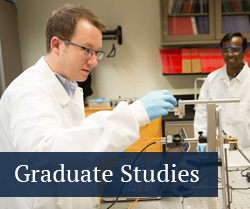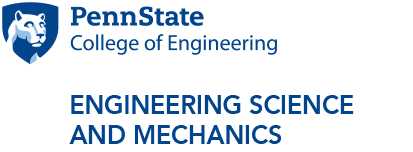
Master of Science in Engineering at the Nano-scale
Our one-year, non-thesis master of science (M.S.) degree program, engineering at the nano-scale, combines an interdisciplinary foundation in nanoscience and nanoengineering with significant hands-on nanofabrication experiences that are essential for graduates to meet the growing industry demand for skilled nanotechnology personnel or to continue towards their doctoral degree.
This residence-based M.S. is a 30-credit program, requiring completion of a scholarly paper. It is ideally suited for individuals with bachelor’s degrees in science, and most engineering fields, who are planning to pursue careers in areas such as biomedicine, aerospace, electronics, information technology, manufacturing, and advanced materials.
The program draws on the engineering science and mechanics department’s extensive nanotechnology expertise, the uniqueness of its world-class interdisciplinary faculty, and the use of the Penn State’s Center for Nanotechnology Education and Utilization teaching cleanroom.
Whether your career interests lie in academia or industry, if you’re ready for a one-of-a-kind graduate program that will prepare you for a career in one of the most rapidly growing and exciting fields, then the M.S. in engineering at the nano-scale is for you.
Course Requirements
Students seeking the one-year, residence-based M.S. degree in Engineering at the Nano-scale will start their degree in the fall semester and are expected to complete all required coursework, including three credits of research, resulting in a scholarly paper, and their degree by the end of the following summer semester.
The plan of study is as follows:
Fall Semester
- Take 9 credits of Core courses
- Take 3 credits of Elective courses
- Take 1 credit of E SC 596-Individual Studies
- Identify adviser (no later than the end of September)
Spring Semester
- Take 6 credits of Core courses
- Take 6 credits of Elective courses
- Take 1 credit of E SC 596-Individual Studies
- Submit title and one-page proposal on individual study research by spring break
Summer Semester
- Take 3 credits of Elective courses
- Take 1 credit of E SC 596-Individual Studies
- Submit final scholarly paper
Credits
- Core Courses: 15 credits
- Elective Courses: 12 credits
- Individual Studies (Research): 3 credits
Total: 30 credits
Course Outline
Required Courses:
- E SC 412: Nanotechnology: Materials, Infrastructure, and Safety (Fall) (3 cr.)
- E SC 520: Engineering at the Nano-scale (Fall) (3 cr.)
- E SC 521: Pattern Transfer at the Nano-scale (Fall) (3 cr.)
- E SC 522: Fabrication and Characterization for Top-down Nano-manufacturing (Spring) (3 cr.)
- E SC 523: Fabrication and Characterization for Bottom-up Nano-manufacturing (Spring) (3 cr.)
Elective Courses**:
Electives may be customized to complete emphases in: (1) energy, (2) electronics and photonics, and (3) nanomaterials; or to explore cutting-edge topics such as bionanotechnology, nanomechanics, and smart nanostructures.
- E SC 414M: Elements of Material Engineering
- E SC 445: Semiconductor Optoelectronic Devices
- E SC 450: (MATSE 450) Synthesis and Processing of Electronic and Photonic Materials
- E SC 481: Elements of Nano/Micro-electromechanical Systems Processing and Design
- E SC 482: Micro-optoelectromechanical Systems (MOEMS) and Nanophotonics
- E SC 483: Simulation and Design of Nanostructures
- E SC 484: Biologically Inspired Nanomaterials
- BIOE 512: Cell and Molecular Bioengineering
- CHEM 511: Chemical Nanoscience
- E SC 501: Solar Cell Devices
- E SC 502: Semiconductor Heterojunctions and Applications
- E SC 511: Engineering Materials for Energy Conversion and Storage
- E SC 541: Laser-Materials Interactions
- E SC 542: Laser-Integrated Manufacturing
- E SC 550: Power Semiconductor Devices
- E SC 551: High-Power Energy Storage
- E SC 577: Engineered Thin Films
- E SC 581: Microelectromechanical Systems/Smart Structures
- E SC 582: Micro- and Nano-Structured Light Emitting Devices
- E SC 583: Micro- and Nano-Optoelectronic Devices and Applications
- E SC 584: Introduction to Bio-Architecture
- E MCH 543: Shape Memory, Smart Materials and Mechanical Behavior
- E MCH 544: Multiscale Modeling and Materials
- E MCH 545: Nanomechanics
*Elective courses are all 3-credit courses. Take 12 credits combined.
**Additional elective courses may be approved by the M.S. NANO director or the engineering science and mechanics (ESM) graduate officer.
Individual Studies (Research):
- E SC 596: Individual Studies (fall/spring/summer) (3 credits total)
Scholarly Paper Requirements
The topic of the scholarly paper will be determined by the M.S. NANO program director and the student. The scholarly paper must demonstrate the student’s capability to integrate and apply concepts and techniques learned in the courses, and thereby, demonstrate the technical, environmental, ethical, and safety knowledge needed to practice engineering at the nano-scale.
An electronic copy of the approved culminating research paper must be submitted to the ESM department at least two weeks before the end of summer classes. Students who need more time to complete the final paper may extend the submission due date after the third semester (summer). The degree will be granted after the paper has been reviewed and approved, and all degree requirements have been met. Students are not required to remain in residence while they complete the final paper.
Subject to permission of the author, all scholarly papers will be published on the ESM department website and on Scholars Sphere at Penn State. They may additionally be submitted for publication to a peer-reviewed journal. Students who plan to publish their work in a journal may delay access to the papers on Scholars Sphere and the ESM website until after publication.
Application Criteria
Bachelor of Science Degree
Prior to starting the program, all applicants must have obtained a baccalaureate degree or equivalent in engineering, science, or a related field from an accredited U.S. university or institution or an officially recognized degree-granting international institution.
GPA
GPA expectations for applicants are: 3.0 or higher. Scores below the minimum value may be considered for admission on a case-by-case basis.
Letters of Reference
Three letters of recommendation should be submitted with the completed application.
Résumé
Statement of Intent
Please tell us why you want to pursue an advanced degree in engineering science and mechanics and how it will help you further your career objectives.
Copies of Transcripts
Transcripts must show all previous coursework.
How To Apply
All applications for ESM graduate programs must be completed electronically through the Penn State Graduate School Admissions and Program Information Portal.
*Please note there is no spring enrollment option for this program. International students are encouraged to apply early.
For additional application details before applying, click here.
If you have any questions, please contact Tammy Coval, graduate program assistant, at 814-863-4586 or tlc21@psu.edu.
If you are ready to apply, click here.

For questions, please contact:
Professor Osama O. Awadelkarim
Director, Center for Nanotechnology Education and Utilization (CNEU)
407D Earth and Engineering Sciences Building
ooaesm@engr.psu.edu
814-863-1773
Associate Head for Graduate Programs Laura Cabrera
Graduate Programs Officer
W316 Millennium Science Complex
lcabrera@psu.edu
814-865-0940
Tammy Coval
Graduate Programs Assistant
212 Earth and Engineering Sciences Building
tlc21@psu.edu
814-863-4586
Susan Barger
Administrative Assistant CNEU
118G Research Building West
sbarger@engr.psu.edu
814-865-9635



